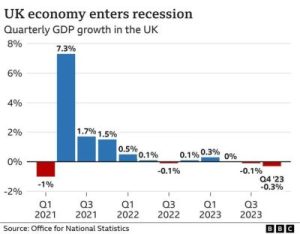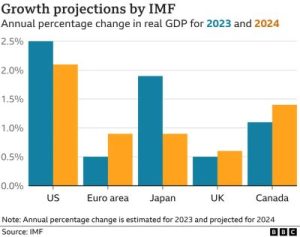What is a recession and how could it affect me?

The UK economy fell into recession during the final three months of 2023, according to official figures.
Prime Minister Rishi Sunak said growing the economy was one of his five key priorities.
How do you measure the health of the economy?
The Office for National Statistics (ONS) publishes figures for the UK’s Gross Domestic Product (GDP). This is the value of all the goods and services the UK produces.
In normal times, a country’s economy grows, GDP rises and average incomes tend to rise as a result.
But sometimes the economy shrinks, GDP falls, and that’s a sign that the economy is doing badly, which could hit people’s pockets.
What is a recession?
The UK is in recession if GDP falls for two successive three-month periods – known as quarters.
The latest figures show that the economy shrank 0.3% between October and December 2023.
That followed a 0.1% fall between July and September and means the economy went into recession at the end of 2023.

Across the whole of the year, the UK economy grew by 0.1%.
The government has never publicly said what measure should be used to assess the prime minister’s pledge to “grow the economy”, despite repeated requests.
In some private briefings, journalists were told it would be met if the economy was bigger in the fourth quarter of 2023 than in the previous quarter. The ONS figures show that it was not.
When was the last UK recession and how long did it last?
The last UK recession was in 2020, at the height of the coronavirus pandemic.
It only lasted for six months, although the 20.4% fall recorded between April and June 2020 was the largest on record.
The previous recession started in 2008 as a result of the global financial crisis, and went on for five quarters, or 15 months.
What happens in a recession and how does it affect me?
For many people, economic growth is good. It can mean that more jobs are available, and that companies can pay more to employees and shareholders.
The higher wages and larger profits seen in a growing economy also generate additional money for the government through taxes.
It can choose to spend more on benefits, public services and government workers’ wages, or cut tax rates.
When the economy shrinks and a country goes into recession, these things can go into reverse.

Some people might lose their jobs, and unemployment could rise. Graduates and school leavers could find it difficult to get their first job.
Others may find it harder to be promoted, or to get big enough pay rises to keep pace with price increases.
However, the pain of a recession is typically not felt equally across society, and inequality can increase.
Benefit recipients and those on fixed incomes are particularly likely to struggle, especially if the government decides to spend less on public services.
How can you get out of a recession?
When a country is in a recession, the Bank of England – which is independent of government – typically cuts interest rates.
This makes it cheaper for businesses and households to borrow money which can boost spending and economic growth.
However, prices have been rising very quickly in the UK, and the Bank put interest rates up to tackle that inflation.
After 14 rate increases, the Bank has held interest rates at 5.25% four times in a row, but cuts are expected later in the year.
When the economy is struggling to grow at the same time as there is high inflation, there can be a situation called “stagflation”.
This can be very difficult to solve, because the two issues require different solutions.
How does the UK’s economy compare to other countries?
The UK has been one of the weaker members of the G7 group of the world’s largest economies.
The US economy grew by 3.3% in the fourth quarter of 2023, which was much better than expected.
That put the US at 2.5% over 2023 as a whole, the best performance of all other advanced economies. It is also expected to outperform the rest of the G7 in 2024.
In October 2023, the International Monetary Fund (IMF) predicted that the UK would grow by just 0.6% in 2024.

The independent Office for Budget Responsibility (OBR) expects the UK economy to grow by 0.7% in 2024, but that is less than half of its earlier prediction of 1.8% growth.
